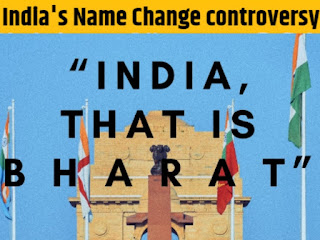India's Name Change Debate: From 'India' to 'Bharat' - A Historical and Constitutional Perspective
India name change to Bharat: In recent times, India has become embroiled in a captivating discourse surrounding its official name, with increasing conjecture about the possible transition from 'India' to 'Bharat.' The intrigue deepened as opposition politicians disseminated an official invitation to a G20 dinner, hosted by "The President of Bharat," diverging from the customary "President of India" designation.
 |
| Image Source: Social Media |
This development has rekindled conversations on the nation's nomenclature, despite Article 1 of the Indian Constitution utilizing both names interchangeably, stipulating, "India, that is Bharat, shall be a Union of States."
Linguistic Diversity: 'Bharatiya' in Government Institutions
While the debate concerning this transition persists, it is imperative to comprehend the historical and constitutional underpinnings of this discourse. Numerous government entities, such as the Reserve Bank of India and the Indian Railways, already incorporate Hindi variations with "Bharatiya" in their titles, reflecting the nation's linguistic diversity.
Historical Roots: Tracing 'Bharata' in Puranic Literature
The origins of the appellation 'Bharat' can be traced back to Puranic literature and the epic Mahabharata. In accordance with Puranas, 'Bharata' denotes the territory situated between the "southern sea" and the "northern abode of snow."
Cultural and Socio-Cultural Interpretations
Prominent social scientist Catherine Clémentin-Ojha interprets 'Bharata' as a religious and socio-cultural entity rather than a purely political or geographical one. In her 2014 article, 'India, that is Bharat…': One Country, Two Names (South Asia Multidisciplinary Academic Journal), Clémentin-Ojha defines 'Bharata' as a "supraregional and subcontinental territory where the Brahmanical system of society prevails."
Ancestral Legacy: 'Bharata' and the Rig Vedic Tribe
'Bharata' also signifies the legendary ancient king who was the forebear of the Rig Vedic tribe of the Bharatas, thereby extending to become the progenitor of all the diverse peoples of the subcontinent.
Nehru's Perspective: Unity and Heritage
In January 1927, Jawaharlal Nehru alluded to the "fundamental unity of India" rooted in a "common faith and culture." He characterized India as "Bharata, the holy land of the Hindus," underscoring the importance of the subcontinent's diverse religious pilgrimage sites located in all four corners of the country.
The ongoing discourse regarding India's official name encompasses historical, cultural, and constitutional nuances, rendering it a subject of profound interest and significance. As this dialogue unfolds, it encourages contemplation of the nation's rich heritage and its future identity on the global stage.





Post a Comment